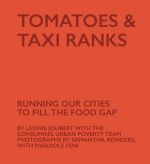Tomatoes & Taxi Ranks: Running Our Cities to Fill the Food Gap

Tomatoes & Taxi Ranks is based on the findings from the Consuming Urban Poverty research project. This represents a collaborative effort by a group of urban geographers, sociologists, economists and planners related to four African cities – Kitwe in Zambia, Kisumu in Kenya, Epworth in Zimbabwe and Cape Town in South Africa. The book was published by the African Centre for Cities at the University of Cape town in line with their aim to enrich knowledge on urban food systems. Composed of various stories from these locations and filled with bright, illustrative imagery, the book is accessible, having been written to reach a broad audience beyond academic interest and to foster public engagement and debate.
The book illuminates the social, economic, political and geographical factors that operate at local, regional and global levels that ultimately influence the food environments and food consumption patterns of the African urban poor. It locates itself within a context of African urbanization characterized by informality. This entails poor planning, uneven regulation and the exacerbation of existing social inequality.
The book grapples with the notion of food security beyond immediate hunger; “food security is about people having sustained access to a nutritious diet for their optimum health” (page 18). In other words, simply not being hungry does not mean that one is food secure. This definition highlights the complex relationship between food and poverty. The book highlights multiple pillars of food security. According to these pillars, food must be available, accessible, usable and stable, and food consumers must exhibit agency (page 27).
The book explores and interrogates trends that relate to food, health, urbanization and poverty. It considers and often rejects popular narratives that dominate policymakers’ discourse and decisions. Among these are the correlations between poverty and obesity explored in Chapter 2. The book challenges the narrative that rising obesity and associated ill health amongst the poor are down to individual behavioural decisions. Instead, it argues that there are complex political, cultural and market forces driving the “food apartheid” that sees poor communities lacking access to healthy foods while flooded with unhealthy ones.
The book highlights the ever-increasing power and control of multinational corporations representing “Big Food” over food environments, with consequences for the nutritional transition, global obesity and obesity-related illnesses. These corporations benefit from massive economies of scale in the production of cheap, packaged, ultra-processed food. Through cheap prices, aggressive advertising and strategic donations of free fridges and vending machines to small, independent and informal shop owners, these corporations contribute to the creation of “food swamps”. Representing a shift in food systems thinking, a food swamp describes the food environment evolving in low-income communities. Unlike a “food desert”, which refers to a place without adequate access to healthy food at affordable prices, a food swamp is a place “flooded with unhealthy, highly processed, low-nutrient food combined with disproportionate advertising for unhealthy food compared to wealthier neighbourhoods” (page 51).
Available from:
http://www.tomatoesandtaxiranks.org.za/the-book/
Book note prepared by Kate Goh
Search the Book notes database
Our Book notes database contains details and summaries of all the publications included in Book notes since 1993 - with details on how to obtain/download.
Use the search form above, or visit the Book notes landing page for more options and latest content.
For a searchable database for papers in Environment and Urbanization, go to http://eau.sagepub.com/

